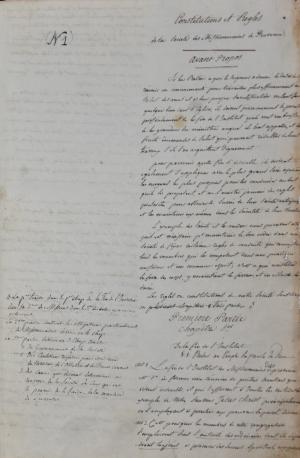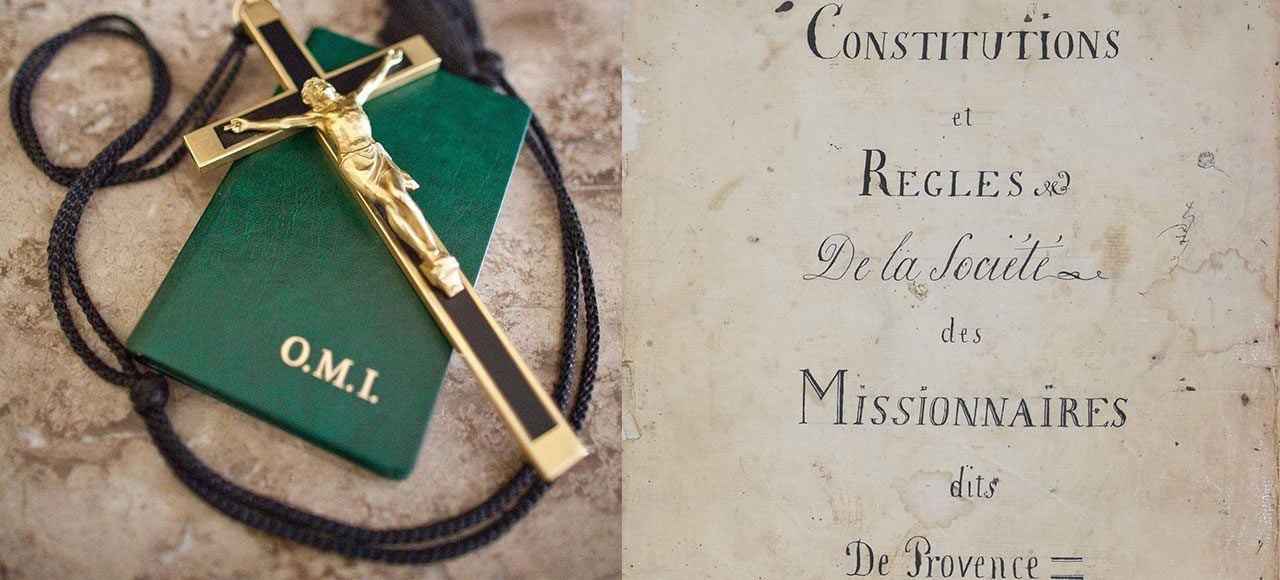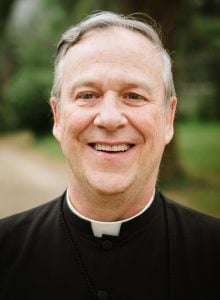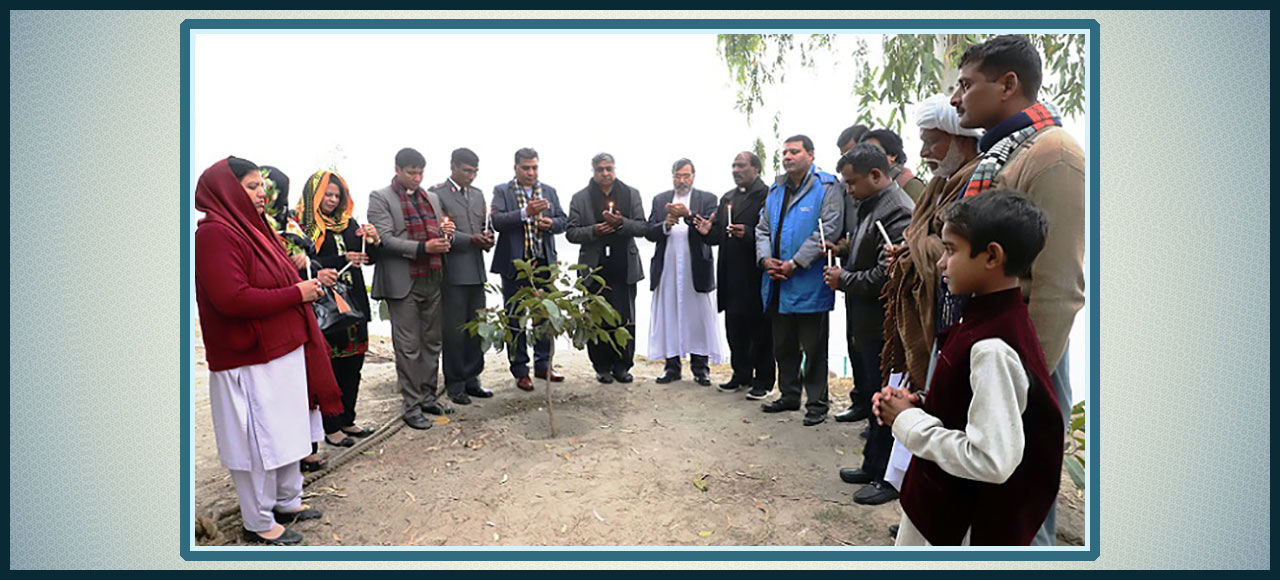The bicentenary of our first Rule
L.J.C. et M.I.
Dear Brother Oblates and all who form part of the Oblate Family,
Among our celebrations of Oblate history, this year is the bicentenary of the first draft of our Rule. Moved by the Spirit to seek companions to start a society whose aim was re-evangelizing the countryside of Provence, the young Eugene very soon felt the need to give this small, young society a code of life, a rule. It would contain norms to help all its members in the twofold objective that he had already outlined in broad terms to the vicars of Aix when, together with his first five companions, he had asked permission to live in community in the old Carmel of Aix, purchased by him for this purpose.
Our first fathers asked to be able to live together in community and under a common rule. The following is from the “petition” and is a synthesis of the main points of this first Rule, which begins by specifying the two main objectives of our first community.
The end of this Society is not only to work for the salvation of one’s neighbor by dedicating itself to the ministry of preaching; its chief aim also includes providing its members with the means necessary to practice the virtues of religion to which they are so strongly attracted that the greater number of them would consecrate themselves for life to their observance in some religious Order, did they not nurture the hope of finding in the Missionaries’ community more or less the same advantages as in the religious state to which they wanted to pledge themselves.
We should read this request for permission, from 25 January 1816, more often; it is a “foundational text” of our family and of our spirituality, a veritable “miniature Rule.”
In the introduction to the book, In Prayer with our Constitutions, Frs. James E. Sullivan and Richard Haslam speak of Oblate life as a long-term project. We read there: “Being Oblates means living the gospel vision that our Founder and each of us received from the Holy Spirit”. This vision is expressed in our “book of life”, our Constitutions, a written expression of the fundamental elements of our religious and missionary vocation, the permanent expression of our charism. On the one hand, our Constitutions crystallize and reflect the experience of the whole Congregation, reinforcing and confirming our everyday life. On the other hand, they show us the ideal that should inspire our life’s project.

The first copy of the Constitutions and Rules handwritten by the Founder (1818)
In the Constitutions, we find who we are and who we should be. The real and the ideal are woven into an endless tension which engages us daily in a continual, patient progress from the real to the ideal, causing the ideal to take flesh in the reality of our lives.
The draft of the 1818 Rule was motivated, among other factors, by the beginning of Oblate presence at Notre-Dame du Laus, scheduled for the first days of the year 1819. Eugene felt it important for the life of the young society to maintain internal unity among its members. Here is what he wrote in his Memoirs: “I believed it was my duty to gather in extraordinary council all those who at that time composed my young society, including the young people who were not yet in the sacred orders. It was to make them understand that, having been called to another diocese for a new foundation, it was necessary to broaden the regulations that governed us and for us to get to work in drafting more extensive constitutions, to form closer ties, to establish a hierarchy, in a word to coordinate everything in such a way that there was only one will and one spirit of behavior”.
Eugene quickly left for Saint-Laurent-du-Verdon, together with Moreau and Suzanne, and stayed there for three weeks. With his two companions, he had some spiritual conversations and the religious exercises. The rest of the time he spent alone, in his room. There, sitting or kneeling in front of his desk, on which before him he had placed his missionary cross, he wrote the rules and constitutions of his Congregation. That is what Fathers Rambert and Rey tell us in their biography of Eugene.
This Rule is also linked to the introduction into our Family of religious vows, ratified at the Chapter which began and probably ended on October 24 1818.
In his presentation to the Congregation of the commentary of Father Jetté to the Constitutions and Rules, Father Zago defined them as a point of reference on which the identity of the family members depends; a source for deepening the charism; a concrete way to discern the will of God; a reflection of the Gospel whose demands they help us understand; a means of renewal for individuals and communities.
He then recalled what Eugene wrote the day after the pontifical approval, 18 February 1826: “The conclusion we must draw is to attach ourselves with all our heart and soul to our Rules and to put into practice exactly what they prescribe”. And a few years later, in the notes for the annual retreat (towards the end of 1831): “So let us hold this precious Rule in high esteem, have it always before our eyes, and even more in the heart, let us continually nourish our souls with the principles it contains, let us do nothing, say nothing, think nothing that is not in conformity with its spirit. It is only in this way that we shall be what God wants us to be and make ourselves worthy of our sublime vocation.”
The Standing Committee for the Constitutions and Rules, created by the Superior General during the first plenary of the 2016 General Council, has begun a project in which it plans to involve the whole Oblate Family in order to preserve the place and value our Constitutions and Rules have in our life and in our mission in the Church and in the world. Upon the occasion of the bicentenary of our Rules, the committee will send to all Oblates a simple and basic questionnaire to help every Oblate reflect and evaluate his life and ministry in the light of this jewel which is our Rule.
The occasion of the bicentenary of our first Rule offers us a privileged opportunity to continue and refocus on the journey of conversion and renewal that we have begun for some years in the Congregation.
It is not enough to have worked for so many years on the new text of our code of life, updating it in the spirit of the Second Vatican Council and giving it a language appropriate to our times, rendering it “capable” of guiding us on the journey of moment in which we live. It is still not enough that this text inspire our life and our missionary work. Nor can we limit ourselves to reading and studying it, using it as an occasional reference for evaluating our Oblate life. For our growth as Oblates and for our charism to continue inspiring us on our journey, we need to be able to assimilate the values that these Constitutions express.
We are living the year of prayer for Oblate vocations. The answer to our vocation, our ability to assimilate the Oblate charism so as to guide us on our journey, all depends on how much we are able to make our own the values contained in our Rule, and on how we make them become part of ourselves. We are called to assimilate them as principles that guide us, as a force that motivates us.
The call that our Constitutions express is a gift from the Lord, and like any gift, we must ask for it, with the desire to transform it into action, with humility and a sense of responsibility. Prayer is essential for internalizing the Rule.
On the day of our perpetual oblation, when we receive the text of the Constitutions and Rules, we are told those words that contain a promise of life: “Do this and you will live!”. And Constitution 168 brings us back to that very moment when it reminds us that “with his oblation, each Oblate takes responsibility for the common heritage of the Congregation expressed in the Constitutions and Rules and in the family tradition”. The common heritage of the Congregation is a legacy that we must receive, cherish and pass on, together with the traditions of our family. Every Oblate is exhorted to “let himself be guided by these norms in creative fidelity to the legacy handed on by Saint Eugene de Mazenod”.
Pope Francis, addressing the Oblate capitulants on 7 October 2016, towards the end of our 36th General Chapter, gave us an invitation in which he joined the Rule to the Last Testament of our Founder. “Following the example of the Founder,” Francis told us, “charity among yourselves is your first rule of life, the heart of every apostolic action; and zeal for the salvation of souls is the natural consequence of this fraternal charity”. With these words, the pope invites us to see in our Rule the reflection of the charismatic inspiration of our common father and his final Testament. Charity among us and, outside, apostolic zeal remain the two pillars on which our charism rests, our reason for being in the Church and in the world, the synthesis of our identity and our missionary activity.
May this anniversary find us available to continue the path of renewal, always active in our lives and in our communities. May Mary and Saint Eugene bless our family and guide it on the paths of its mission in today’s world!
Your brother in Jesus and Mary Immaculate,
Fr. Louis Lougen, OMI



